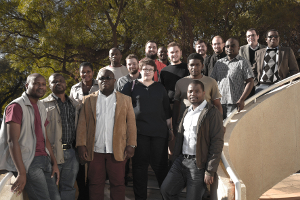Latest News Archive
Please select Category, Year, and then Month to display items
02 January 2025
|
Story Gerda-Marie van Rooyen
|
Photo Supplied
 Leading the research in South Africa is Prof Linus Franke from the Department of Soil, Crop and Climate Sciences.
Leading the research in South Africa is Prof Linus Franke from the Department of Soil, Crop and Climate Sciences.
Scientists are actively pursuing the successful breeding of diploid hybrid potatoes from inbred lines. This is expected to revolutionise potato breeding as it holds the key to rapid genetic progress. It will introduce new varieties for commercialisation through seed. Currently, existing potato variants have a gene that renders self-pollinated seeds infertile.
Prof Linus Franke, an academic in the Department of Soil, Crop and Climate Sciences at the UFS, is leading the research in South Africa. “This technology allows the production of genetically uniform potato seed that is easy to transport and largely disease-free.” He says this differs from conventional breeding whereby only vegetative propagation is possible due to tetraploid varieties in potatoes. It also risks carrying pests and diseases from one generation to the next – leading to the accumulation of pests and diseases with each round of multiplication.
Seed innovation
Prof Franke explains that Solynta BV, a seed company based in the Netherlands that produces potato varieties that can be grown from seed, has included South Africa in their research efforts because it is one of Africa’s largest producers and exporters. Through his academic relationship with Wageningen University and Research, a Dutch institution renowned for its agricultural endeavours and food production, the UFS became involved in researching hybrid potatoes grown from seed.
Diploid seeds containing two sets of chromosomes allow easier gene manipulation to increase predictability and speedier genetic progress. The breeding approach enables the incorporation of tolerance to pests, diseases, abiotic stresses (cold, heat, drought) and other desired genetic traits.
Although Prof Franke is optimistic about this research, he is not blind to disadvantages. “Potato seeds are tiny and have little energy reserves, making it harder to grow potatoes from seed than from tubers.” He says potatoes from seed will take longer to cultivate than tubers, as farmers need to grow plantlets from seeds first, adding six weeks to the growing period. “It is possible that commercial farmers can grow potatoes directly from seed. Alternatively, perhaps more likely, specialised growers will produce tubers of potatoes from seed; these tubers are then sold as seed tubers to other potato farmers, who then continue their normal practices of producing potatoes for the market from tubers.”
Financial benefits
Prof Franke says farmers have reason to get excited. “Seed potatoes will reduce input costs, as varieties with enhanced tolerance to pests and diseases require less pesticides. Planting one hectare of potatoes requires three to four tonnes of potato tubers, but only one 25 g packet of potato seeds.” Since potatoes are a more valuable commodity than maize, this technology might also increase farmers’ income potential.
UFS International Studies Group makes history come alive globally
2015-07-15

The UFS International Studies Group comprises students who are top achievers drawn from South Africa, Southern and Central Africa and even further afield.
Photo: Charl Devenish |
Headed by Prof Ian Phimister, the UFS International Studies Group comprises six master’s, twelve PhD and twelve postdoctoral fellows who concentrate their research endeavours on African, Imperial and Global History. All of these students are top achievers drawn from South Africa, Southern and Central Africa and even further afield. This group, now only in its third year, presents a phenomenal research output with an international reach.
In the course of the past year alone, five PhD students secured fully-funded invitations to conferences and research seminars in South Africa, Britain, as well as the Netherlands. Our researchers have been publishing articles globally and securing visiting fellowships and research awards.
Dr Clement Masakure and Dr Rosa Williams won funding to present papers at the International Network for the History of Hospitals. Tinashe Nyamunda won a prestigious three-month Cadbury Fellowship at the University of Birmingham in the United Kingdom. Anusa Daimon has been selected as a 2015 Harry Guggenheim award winner, which covers workshop attendance in Nairobi, Kenya.
From among the group, twelve articles have been published or accepted for publication in refereed scholarly journals, as well as four chapters in edited books. Book reviews written by these highly-motivated graduate students, have appeared or will appear in leading national and international academic journals. Remarkably, seven book reviews appearing in one particular issue of African Studies Review, were written by this group. Four scholarly monographs have recently been published, or soon will be. One PhD student is the joint editor (with a senior Canadian academic) of a forthcoming study on Zimbabwe’s controversial Marange diamond mining industry.
Another outstanding researcher, Dr Lindie Koorts, won the award for the best debut writer at the 2014 Woordfees for her book ‘DF Malan and the Rise of Afrikaner Nationalism’ – the first non-fiction writer to achieve this. Her book now appears on the longlist for the 2015 Alan Paton Award.